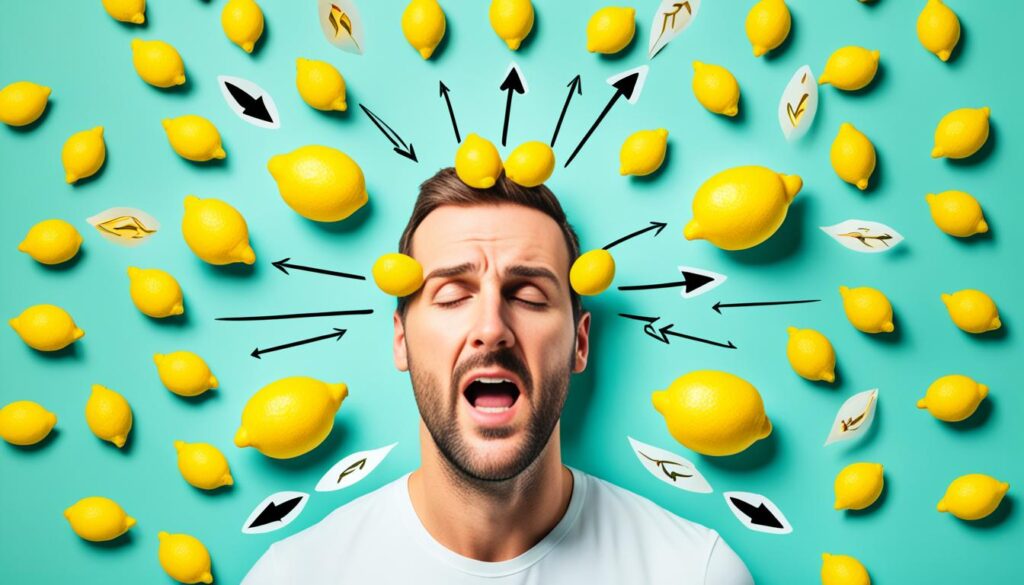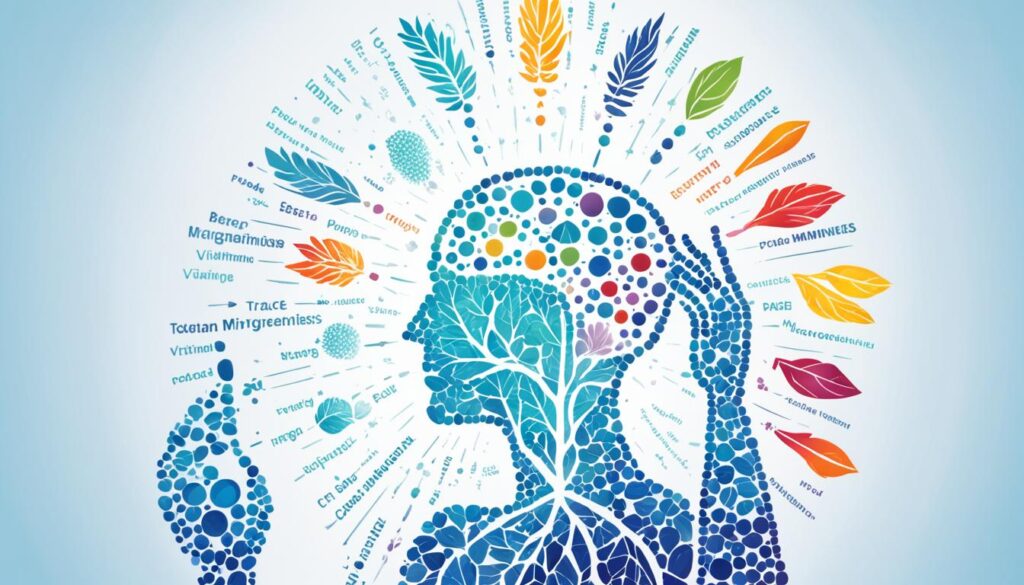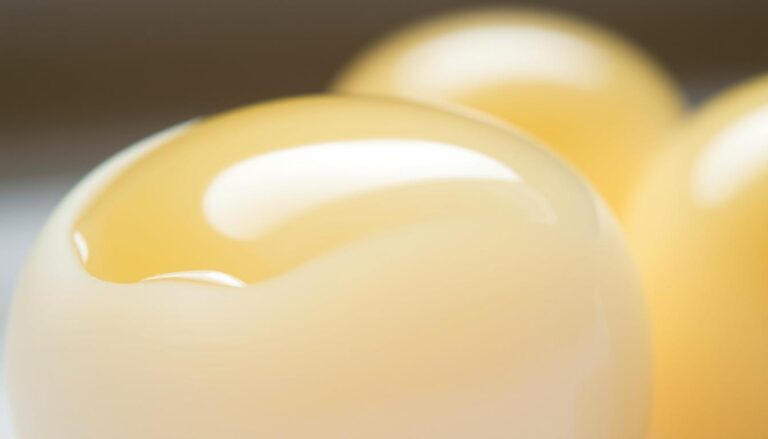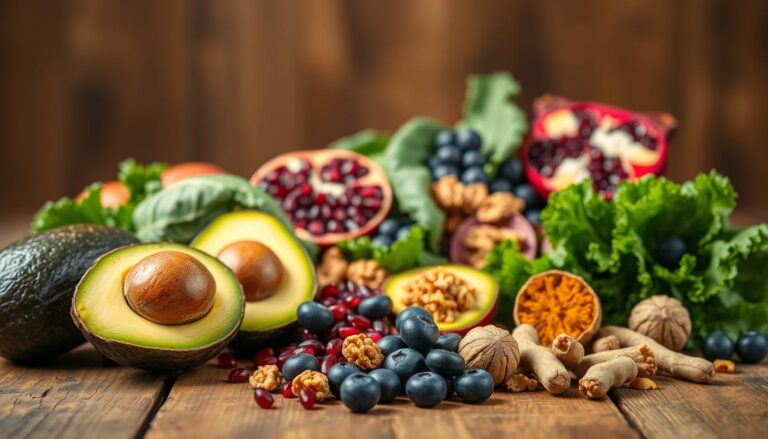Do you find it hard to deal with migraine headaches? Imagine if there was a simple natural way to stop them before they start. Let’s dive into how vitamin B2 or riboflavin, can fight off these severe headaches.
Key Takeaways
- Vitamin B2 riboflavin has been studied for its potential to alleviate and prevent migraine headaches.
- Riboflavin may help address nutrient deficiencies that can contribute to migraines.
- Incorporating riboflavin-rich foods and supplements can be part of a holistic approach to migraine management.
- Trace minerals like manganese may also play a role in migraine prevention alongside vitamin B2.
- A comprehensive, natural strategy involving dietary changes and targeted nutritional supplements may offer a promising solution for chronic headache sufferers.
The Migraine Fighting Power of Vitamin B2
Vitamin B2, or riboflavin, is a hot topic in managing migraines. Studies show it might help people with severe headaches. This essential nutrient could be key in easing migraine pain.
Exploring the Link Between Riboflavin and Headache Relief
Riboflavin, or riboflavin, from clinical trials, seems to fight migraines naturally. It changes how our brain works, possibly lessening migraine effects. Generating energy in our cells is a vital job for this vitamin. It may stop some migraine triggers before they start.
In the European Journal of Neurology, a study showed riboflavin cut down migraine attacks. It also made headaches less intense and shorter. Adding enough riboflavin to your diet could truly help with migraine relief.
Understanding the Role of Nutrient Deficiencies in Migraines
New research points to low levels of vitamins and minerals as migraine causes. Jobs like magnesium deficiency and vitamin B2 deficiency raise the chance of getting migraines. Fixing these shortages might bring relief from headaches.
It’s crucial to grasp how nutrients and migraines are connected for good headache management. Looking into vitamin B2 and trace minerals offers hope. For people wanting to combat migraines naturally, these areas could be key.
Riboflavin: A Potential Migraine Remedy
Migraines are severe headaches that can make life very hard. But, there’s hope. Research shows that vitamin B2, or riboflavin, might be able to help. This vitamin is being looked at closely because it could reduce how often and how bad these headaches are.
Many studies have checked if riboflavin supplements can help with migraines. In one, a review was published in the Journal of Headache and Pain. It said taking a high dose of riboflavin daily 400 mg could lower how many migraines a person gets by up to half.
Riboflavin’s potential as a natural remedy for migraines lies in its ability to improve mitochondrial function and energy production, which may help prevent the onset of migraine attacks.
Experts think riboflavin works by making our cells’ powerhouses, the mitochondria, work better. This might stop migraines before they start. They also say that not having enough vitamin B2 could make migraines more likely. So, taking more of it could fix this problem.
| Riboflavin Dosage for Migraine Relief | Potential Benefits |
|---|---|
| 400 mg per day |
|
Before trying riboflavin supplements, talking to a doctor is a must. By trying out this vitamin B2, people with migraines might find a new piece for their overall plan to manage headaches.

Migraine Relief Through Natural Remedies
Many folks are now looking towards natural remedies to help with migraines. They use these as extra help to the usual medicines. Nutritional supplements, rich in vitamins like manganese and riboflavin, are popular. They might prevent migraine attacks.
Complementing Traditional Treatments with Nutritional Supplements
Some people choose to manage their migraines more naturally. They add nutritional supplements to their routine. These supplements can help deal with what causes the headaches.
- Vitamin B2 riboflavin helps with migraine relief and stopping future attacks.
- Manganese, a trace mineral, might lower how often and bad migraines are.
- Adding natural remedies to regular treatments makes migraine care more complete.
Using natural remedies and supplements together makes managing migraines more personal. It also tackles more parts of the migraine issue.
Incorporating natural remedies, such as nutritional supplements, can offer an additional layer of support in addressing the underlying causes of migraines.
Researching how vitamins, minerals and natural elements can help is key. It lets people be more involved in their migraine care.
Like manganese and riboflavin it may help prevent migraines
Manganese and vitamin B2, or riboflavin, could be key in stopping migraines. Some studies show these nutrients work together to prevent bad migraine headaches. They are essential and can be found in food and as supplements.
Manganese is a mineral in many foods. It is known for its migraine-relief properties. It helps control how neurotransmitters work in your brain. This can affect how often and how bad your migraines are.
Vitamin B2 boosts energy in the body’s cells. It helps fix issues that might lead to migraines. By working together, manganese and vitamin B2 may be very helpful for those who often get migraines. They focus on fixing nutrient shortages that could be contributing to your headaches.
| Nutrient | Role in Migraine Prevention |
|---|---|
| Manganese | Regulates neurotransmitter function, which can influence the frequency and intensity of migraines. |
| Riboflavin Vitamin B2 | Enhances energy production within the body’s cells, helping to reduce the metabolic imbalances that can trigger migraines. |
Using these nutrients as part of your plan for dealing with migraines can help. With a mix of good nutrition and lifestyle changes, you might not need as much medicine. This approach is a promising way for many to deal with the pain of migraines.

Manganese and riboflavin work synergistically to address the underlying nutritional deficiencies that can contribute to migraines, offering a more holistic approach to prevention.
Headache Management A Holistic Approach
Migraines and chronic headaches can really slow a person down. Traditional treatments like medicine help, but a holistic method could do better. This approach uses diet changes and taking more vitamin B2. Doing this, people might find real and lasting relief from their headaches.
Combining Dietary Changes and Vitamin B2 Supplementation
There is evidence showing certain foods can make migraines worse. Foods like processed meats, aged cheese, and even caffeine might be triggers. Figuring out and avoiding these foods can help lessen the headaches you get.
Adding vitamin B2 to your daily routine might boost these diet changes’ good effects. This vitamin has been found to fight migraines. It might even help stop them from happening or make them shorter when they do.
| Dietary Changes | Vitamin B2 Supplementation |
|---|---|
|
|
Using both dietary changes and taking extra B2 could really change things for the better. This way, people can actively manage their headaches and feel better overall.

Adding diet changes and vitamin B2 to a headache plan could be a big help for those wanting natural, long-lasting relief.
These two strategies working together can give back control over headaches. They can lead to a life that’s more healthy and full of energy.
Trace Minerals The Unsung Heroes in Migraine Prevention
In the quest to beat migraines, we often talk about well-known vitamins like riboflavin (vitamin B2). But, we should also look at trace minerals, like manganese. These minerals might not get all the attention, but they work with vitamin B2 to fight migraines from different angles.
Manganese is a small but mighty mineral our body needs. It’s getting more attention as a possible aid against migraines. Research shows it might help control brain chemicals that can start migraines.
Manganese could also fight off swelling because it has anti-inflammatory powers. When it teams up with vitamin B2, it could address the body issues that start migraines. This combo could be a powerful strategy against these bad headaches.
Now, let’s dive deeper into how trace minerals can help prevent migraines when added to a full wellness plan.
| Trace Mineral | Potential Benefits for Migraine Prevention |
|---|---|
| Manganese | Regulates neurotransmitter levels, possesses anti-inflammatory properties |
| Magnesium | Helps to relax blood vessels, reduces muscle tension, and may alleviate migraine-related symptoms |
| Zinc | Plays a role in modulating pain perception and may help to reduce the frequency and severity of migraines |
Learning about the crucial role of trace minerals in stopping migraines can help. If you suffer from these headaches, consider a balanced approach with these minerals and riboflavin. This mix might be the secret to a migraine-free life.

Nutritional Supplements The Natural Alternative
More people are turning to natural ways to fight migraines. Vitamin B2, or riboflavin, is getting a lot of attention for its benefit against migraine. This rise in alternative treatments has changed how people manage their headaches.
Embracing a Proactive Approach to Migraine Relief
Being proactive is crucial in handling migraines. Instead of waiting for a migraine to occur, smart people are using riboflavin and other nutritional supplements every day. This proactive method lets them fight migraine causes and get real relief without just using medicine.
Using natural ways like vitamin B2 can help conventional treatments. It helps fill nutrient gaps and supports holistic health. This can lower the number and strength of migraines, making life better.
Embracing a proactive approach to migraine relief with the help of nutritional supplements has been a game-changer for me. I no longer dread the next headache, but instead feel empowered to manage my condition effectively.
For those looking for a natural alternative to usual headache treatments, adding riboflavin and selected supplements is a smart move. This proactive approach helps people control their health. They can finally find the relief they’ve been looking for.

The Science Behind Vitamin B2 and Migraines
Vitamin B2, or riboflavin, is a great natural way to fight migraines. Many studies show its benefits. It’s important to look closely at how this nutrient helps with migraine symptoms.
Studies show a link between vitamin B2 and migraines. It seems to work by making our cell’s energy centers, called mitochondria, work better. Since poor mitochondrial function may lead to migraines, vitamin B2’s help is crucial.
Vitamin B2 also affects brain chemicals like serotonin. These chemicals play a role in migraine development. By balancing them, vitamin B2 can reduce migraine symptoms like light and sound sensitivity.
Moreover, vitamin B2 fights inflammation, which is a big part of migraines. Inflammation can make our pain nerves more sensitive. By fighting this, vitamin B2 helps ease migraine pain.
Vitamin B2 has emerged as a promising natural remedy for migraines, with growing scientific evidence supporting its ability to alleviate symptoms and address the underlying causes of these debilitating headaches.
Scientific evidence strongly supports using vitamin B2 for migraines. It’s a smart choice for those looking for a holistic remedy. By knowing how vitamin B2 works, both doctors and patients can use it effectively.
Dietary Sources of Riboflavin
Vitamin B2, or riboflavin, is vital for preventing and managing migraines. Eating foods rich in riboflavin is a natural way to help. This can lower migraine symptoms.
Incorporating Migraine Fighting Foods into Your Diet
Riboflavin is in many common foods. This makes it simple to add to your meals and snacks. Let’s check out some great sources:
- Organ meats Liver and kidney offer over 100% of your daily riboflavin in one serving.
- Dairy products Milk, yogurt, and cheese are good sources, especially if they’re low-fat and fortified.
- Eggs Eggs including both the yolk and white, have lots of riboflavin.
- Almonds A few almonds will give you a good dose of this nutrient.
- Mushrooms Mushrooms like shiitake and portobello are also high in riboflavin.
- Leafy greens – Spinach, kale, and other dark greens are rich in riboflavin.
By eating these foods, you can get enough riboflavin. This might help fight off migraines without supplements.
| Food | Riboflavin Content mg per serving |
|---|---|
| Organ Meats | Liver is at 2.8 mg per 3 oz |
| Dairy | Milk offers 0.4 mg in 1 cup |
| Eggs | One large egg has 0.3 mg |
| Almonds | 1 oz of almonds contains 0.3 mg |
| Mushrooms | Raw mushrooms provide 0.4 mg per cup |
| Spinach | Cooked spinach has 0.4 mg per cup |
Adding these migraine-fighting foods to your diet works. It’s a natural and effective way to get more riboflavin. Plus, it might help ease the symptoms of migraines.
Vitamin B2 Deficiency A Potential Migraine Trigger
Vitamin B2 or riboflavin is crucial for migraines. New studies show not having enough may lead to worse headaches. It plays a big role in how our body makes energy.
If you lack vitamin B2, your cells’ powerhouses, the mitochondria, may not work right. This can lead to migraines starting.
It’s been found that those who get migraines may have less B2. So, having enough B2 is important to fight off migraines and lessen their strength.
Yet, fixing a B2 shortage is not the whole story. Adding more riboflavin may help lower how many migraines happen and how bad they are.
| Symptoms of Vitamin B2 Deficiency | Impact on Migraine |
|---|---|
|
|
If you have migraines, dealing with nutrient gaps could help. Using natural approaches, like getting enough B2, is part of managing headaches. This can offer a more rounded way to treat migraines.
Maintaining optimal levels of vitamin B2 may be a key factor in preventing and managing migraine headaches.
Conclusion Embracing a Holistic Approach to Migraine Prevention
We’ve explored how vitamin B2, or riboflavin, fights migraines. It shows a full approach is crucial for real relief. Migraines have many triggers, like what we eat and how we live. A mix of natural steps and lifestyle changes helps beat these painful headaches.
Taking vitamin B2 and minerals is a good start. But, we need more. Eating foods that fight migraines, staying active, and handling stress also matter. By doing all this, we help our body work its best and keep migraines away.
Let’s toast to a migraine-free future. We can enjoy our days fully, without fear of headaches. A holistic path guides us to a life without migraines. This way, every moment can be enjoyed without worry.





